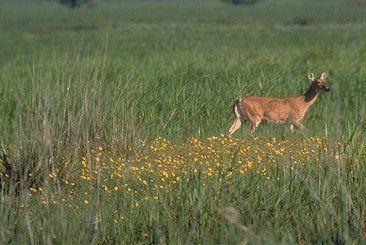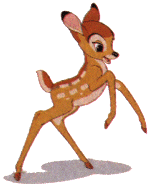 Key Deer Page
Key Deer Page
 Key Deer Page
Key Deer Page

The Key deer is related to the white-tailed deer. It is the smallest of
the white-tailed deer. Only the male deer have antlers. Their antlers drop
in February-March, they re-grow them so that in June, you can
see stubs that are 2 inches. They are done growing their antlers
by August. Key deers can have a little bit of salt in their water, and
will drink brackish water. But in order to keep alive they need some fresh
water. Breeding season is in September and decreases through out November
and December. They carry their babies for about 204 days. Fawns are born
in April through June. When fawns are born they weigh 2-4 pounds.
No records exist telling where the Key deer is from, but they think its
from Mainland but they are not sure. In the 1940's less than 50 Key deers
where alive, putting them on the endangered list! But now it's estimated
that about 250 Key deers exist ! That's a big improvement! But Key deers
are often killed by cars. In Winter they depend on fat in their bodies
to keep warm and to eat. In the Spring the coat that they used for
the Winter is shedded. In Fall their is much food available. The Key deer
is the smallest deer in the United States! As we all know many animals
have unuaual actions that follow their characteristics. Well, the Key Deer
is one of them (that is one reason why I chose to do research on this particular
animal)! One of its interesting (and unusual) habits is thet it walks on
its tip toes constantly! Also many animals change colors during time periods
such as Leopards. Well, believe it or not a Key Deer is the same way! They
change from a reddish brown to a grizzled gray. And their horns are made
of keratin(the same thing that nails are made of)! That is some of
its unusual habits. Key Deers are sometimes running for their lives while
being hunted down by dangerous predators, such as dogs, Golden Eagles,
hunters and ... cars! Yes, thats right many vehicles kill these harmless
animals each year. I just hope that they do not become extinct! The 1940's
have passed and I hope now that all these years had passed that people
have learned to drive carefuly in THE BIG PINE KEY AREA!
 |
